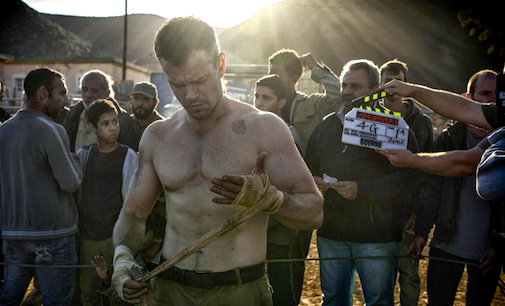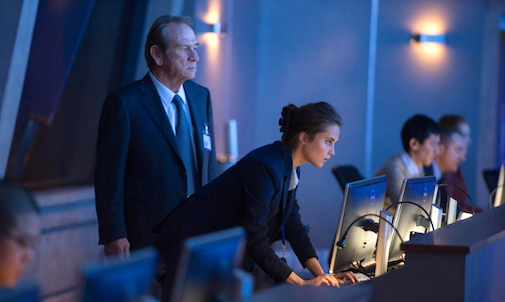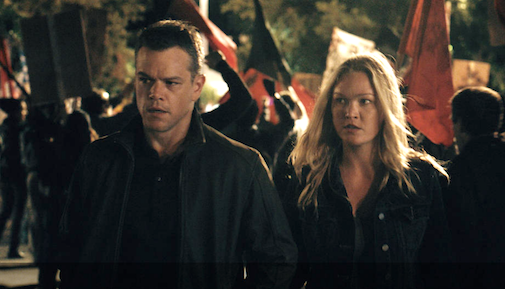Review: Jason Bourne
 Friday, July 29, 2016 at 9:55PM
Friday, July 29, 2016 at 9:55PM It’s Eric, returning to talk about the fifth chapter in the popular Jason Bourne franchise. Judging from the discussions I heard coming from the exit of an early screening of Jason Bourne, your enjoyment of this latest installment of the venerated action spy films probably rests in your expectations.

Because the level of artistry involved with these films has been so high, some out there are naturally hoping that the creative forces behind Jason Bourne found a way to ratchet things up even further. The main grumble outside the theater seemed to be that the films have gotten repetitive in form and content (Bourne finds himself in a huge public space, uses the natural crowd to escape, etc.).
I find myself in a different camp: to me, it’s exactly these set-ups, and specifically the skillfulness with which they’re executed, that fuel the enjoyment...
Basically, Jason Bourne is structured by four gigantic globe trotting action set pieces: Athens, Berlin, London, and Las Vegas. The Athens sequence in particular proves dazzling, as it’s set within a protest which creates “natural” chaos that adds a beautiful amount of visual tension to the segment.
There’s no doubt that the Bourne movies are a brand: this chapter, like all before it, combines the same elements: handheld cameras only, complex soundscape, lightning-fast editing, natural color palette, and multiple camera subjects all moving forward with simultaneous velocity. Jason Bourne doesn’t mess with this formula. It doesn’t elevate the formula, either; if you feel like you’ve seen your share of watching Matt Damon beat the shit out of people and escape from seemingly-inescapable crowd situations, you’d best sit this out.

Director Paul Greengrass returns (he directed chapters two and three), and while his work this time feels slightly more corporate than inspired, he keeps each scene, each segment, and the entire film lean and mean. There’s no fat in what Greengrass shows us, and he focuses squarely on Bourne’s wrestle with identity without it becoming too monotonous. This installment, like the ones before it, is humorless, but in Greengrass’ hands it never becomes ponderous.
Damon has such natural authority now, and while he doesn’t get to show the colors he displayed so beautifully last year in The Martian, he digs to find a new level for Bourne. In this film, Bourne more than ever feels like a person with no center, no inner life…not the easiest sort of character to play. Damon always finds ways to show that behind the machine that is Bourne, he remains lost: he may be a professional mastermind, but personally he truly doesn’t know what to do. Damon’s portrayal of this dichotomy, with its layers of fear, anger, confusion, and panic, remains a key reason why these films always feel “real” despite their obvious escapist pull.
When The Bourne Identity was released in 2002, it arguably broke the action film mold. The immediacy of the editing, the lack of special effects, etc. made it all feel very new. Fourteen years later, its influence has been seen in countless films and its style is the new norm. Maybe that’s why Jason Bourne doesn’t feel as exciting to some people any more, but I’d argue that this no longer new style is still not being filmed with this level of control, intelligence, and ingenuity anywhere else.

 Action,
Action,  Bourne,
Bourne,  Julia Stiles,
Julia Stiles,  Matt Damon,
Matt Damon,  Paul Greengrass,
Paul Greengrass,  Reviews,
Reviews,  sequels
sequels 


Reader Comments (8)
I've never really liked any of the Bourne films. In fact, I much prefer the TV movie from 1988 with Richard Chamberlain and the stunning Jaclyn Smith. Am I the only one?
@Adam Lewis: Never saw the 1988 TV movie - or read any of the books, to be honest - but I'm also not a fan of the Bourne films. I fell asleep through chunks of the first film; tried to give the second film a chance but fell asleep through most of that one too; and I just gave up after that. Something about this series just doesn't do it for me (maybe they just feel like the exact same story over and over again? I don't know); and the fact that it popularized the shaky cam action sequence doesn't help matters either.
Ugh! I hate the shaky cam as well! Ever since Saving Private Ryan most action films have been ruined by it!
The miniseries is on YouTube and is definitely worth a watch. It's well-directed,acted and has a great score too. It is very close to the book.
My difficulty with the Bourne films is I don't much care about the story, but I suppose that's true of most James Bond movies as well.
The first movie was the best
Near the end of the "Jason Bourne" movie we see Jason Bourne having a conversation with Dewey in Dewey's room after the failed assassination attempt. We see the black security man on his way to Dewey's room in a flash. Then the picture goes back to Dewey's room where we see the female agent shoot Dewey before he can kill Bourne. The next scene is Bourne telling the agent to leave and that she was never in the room. My question is what happened to the black agent that was shown coming off the elevator and running towards Dewey;s room with his gun drawn?
Milton someone wasn't paying attention in the editing room
Milton: [SPOILER ALERT!!!] Bourne shoots him as he comes into the room. Dewey takes advantage of this distraction, reaches for his gun to finish Bourne off, and that's when Lee shoots Dewey.